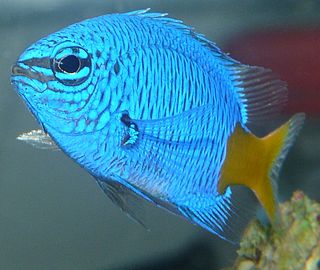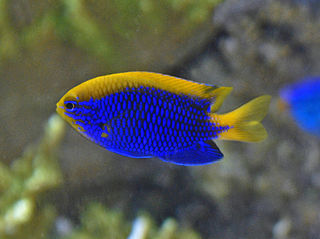
The Garibaldi, known historically also as the Catalina goldfish and marine goldfish and now commonly as the Garibaldi damselfish is a species of bright orange fish in the damselfish family. It occurs in the subtropical northeastern part of the Pacific Ocean. The English name, Garibaldi, is based on an Italian surname and is a reference to the Italian general and political figure Giuseppe Garibaldi, whose followers often wore a characteristic scarlet or red shirt. As is the case in all damselfish, male Garibaldis aggressively defend the nest site after the female lays eggs.

Damselfish are those within the subfamilies Abudefdufinae, Chrominae, Lepidozyginae, Pomacentrinae, and Stegastenae within the family Pomacentridae. Most species within this group are relatively small, with the largest species being about 30cm in length. Most damselfish species exist only in marine environments, but a few inhabit brackish or fresh water. These fish are found globally in tropical, subtropical, and temperate waters.

Chrysiptera is a genus of damselfish in the family Pomacentridae.

Fire corals (Millepora) are a genus of colonial marine organisms that exhibit physical characteristics similar to that of coral. The name coral is somewhat misleading, as fire corals are not true corals but are instead more closely related to Hydra and other hydrozoans, making them hydrocorals. They make up the only genus in the monotypic family Milleporidae.

Chrysiptera cyanea is a species of damselfish found in the wide Indo-West Pacific but not known in the Red Sea. A few individuals were observed in the Mediterranean Sea in 2013 off Slovenia, a likely aquarium release.

Chrysiptera parasema, also known as yellowtail damselfish, yellowtail blue damsel, goldtail demoiselle, and other variations, is a popular saltwater aquarium fish from the Indo-Pacific. It was described by Fowler in 1918.

Dascyllus melanurus, known commonly as the four stripe damselfish, blacktail dascyllus, humbug damselfish, blacktail damselfish, and blacktail humbug, is a species of fish in the family Pomacentridae. It is native to the western Pacific Ocean. It is sometimes kept as an aquarium pet.

Chrysiptera taupou, known commonly as the southseas devil, southseas demoiselle, and Fiji damsel, is a species of damselfish. It is native to the western Pacific Ocean from the Coral Sea to Samoa.

Chrysiptera talboti, known commonly as Talbot's damselfish and Talbot's demoiselle, is a species of damselfish. It is a marine fish from the eastern Indian Ocean and western Pacific. The specific name honours the fisheries scientist Frank H. Talbot the director of the Australian Museum in Sydney, the collector of the type.

Chrysiptera hemicyanea, known commonly as the azure damselfish, azure demoiselle, half-blue demoiselle, and yellow-dipped damsel, is a species of damselfish.
Chrysiptera galba, the canary demoiselle, is a species of damselfish. It is native to the western Pacific Ocean. It reaches 7 centimeters in length. The male guards and tends the eggs.

Chrysiptera springeri is a species of damselfish known by the common name Springer's demoiselle.

Chrysiptera starcki is a species of damselfish known by the common name Starck's demoiselle. It is native to the western Pacific Ocean, where it has been reported from the Ryukyu Islands and Taiwan to Australia, New Caledonia, and Tonga. It was originally described in 1973 as Abudefduf starcki.

The yellowtail damselfish is a species of damselfish native to tropical areas such as the Caribbean coast of Panama. Damselfish are abundant in coral reef environments. The International Union for Conservation of Nature lists this fish as being of “least concern”. The species is exploited on a minor scale, for fisheries and the aquarium trade. It may be threatened by the invasive lionfish.

Stegastes planifrons is a damselfish from the Western Atlantic. It occasionally makes its way into the aquarium trade.
Chrysiptera caeruleolineata, commonly called the blueline demoiselle, is a species of damselfish from the Indian and western Pacific Oceans. It is up to 6 centimeters long.

Chrysiptera rex is a species of damselfish known by the common name king demoiselle. It is native to the eastern Indian Ocean and western Pacific, where it lives around reefs. It grows up to 7 centimeters long. It is of commercial importance in the aquarium trade.

Chrysiptera rollandi is a species of damselfish known by the common name Rolland's demoiselle.
Tipulamima tricincta is a moth of the family Sesiidae. It is known from South Africa.

The marine wildlife of Baa Atoll consists of marine species living in a circular archipelago in the Maldives, inside the administrative division of Baa Atoll, which is the southern part of Maalhosmadulu Atoll. Baa Atoll was named a biosphere reserve by UNESCO in 2011.

















